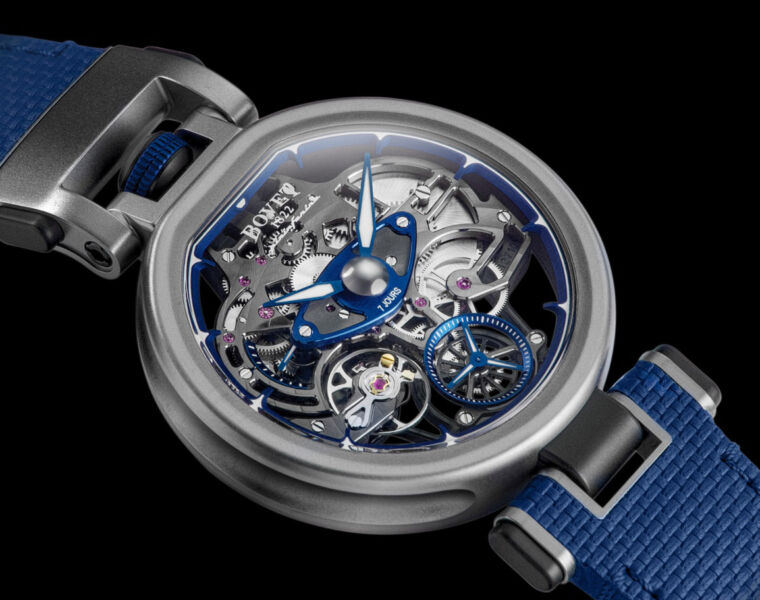![]()

In 2015, with the introduction of its “Chamber of Wonders” collection, Girard-Perregaux provided its first glimpse into the field of miniature creation with the artistic tradition known as cabinets of curiosities.
This art form made popular during the Renaissance was imbued with magic and fantasy, held the unmistakable charm of adventure. An infinitely small object becomes a canvas for the creativity of artisans specializing in rare handcrafts, which Swiss fine watchmaking has renamed artistic crafts.
Girard-Perregaux is continuing to celebrate this meticulous skill and patience in an original manner with the second installment of the “Chamber of Wonders”.  Here, the values of aestheticism and fine workmanship, on which the Manufacture has specialized since 1791, has found a new view even in the confined space of a watch dial. Against a backdrop of poetry, the beckoning sea, and fantasy, the pieces are invaded by a winning combination of exceptional materials and techniques that are becoming increasingly scarce.
Here, the values of aestheticism and fine workmanship, on which the Manufacture has specialized since 1791, has found a new view even in the confined space of a watch dial. Against a backdrop of poetry, the beckoning sea, and fantasy, the pieces are invaded by a winning combination of exceptional materials and techniques that are becoming increasingly scarce.
For 2016, Girard-Perregaux expands its 1966 pink gold collection with a trio of numbered pieces powered by a self-winding Manufacture caliber with dials that either celebrate the Earth as seen from space, or space as viewed from Earth. These interplanetary journeys are opening up the “Chamber of Wonders” to even more colorful interpretations of the past, and to new understandings of objects that are references in world history. They are the original combination of the manufacture-based arts of a mountainous area dedicated to excellent watchmaking and the multidisciplinary knowledge representing the openess to the world.
More than simple demonstrations of manual skills, the map representations reproduced and reinterpreted on the dials of the three 2016 “Chamber of Wonders” models celebrate the visions of scholars and famous figures in the history of humanity. They tell a tale of perceptions, which demonstrates the extent of knowledge at the time when their illustrious creators first expressed them. Their connection to the passing of time and its creation of certainties is undeniable.
The Chamber of Wonders – Center of the Universe Earth
 Greco-Roman astronomer Ptolemy, one of the founding fathers of geography, the creation of which dates back to less than one hundred years AD, was fascinated by the interactions of the Earth and Sun, and the Earth and Moon, as well as their influence on climates. Although incomplete, his representation of the Earth was already seemingly spherical, inventing the geometry still in use today of a grid of latitudes and longitudes. His treatise of geography and the maps represented in it, translated into Latin by d’Angelo, inspired Christopher Columbus, who carefully studied these outlines, finding further motivation to carry out his sailing plans.
Greco-Roman astronomer Ptolemy, one of the founding fathers of geography, the creation of which dates back to less than one hundred years AD, was fascinated by the interactions of the Earth and Sun, and the Earth and Moon, as well as their influence on climates. Although incomplete, his representation of the Earth was already seemingly spherical, inventing the geometry still in use today of a grid of latitudes and longitudes. His treatise of geography and the maps represented in it, translated into Latin by d’Angelo, inspired Christopher Columbus, who carefully studied these outlines, finding further motivation to carry out his sailing plans.
Stone marquetry, and miniature and gold powder painting
The creation of this rare Girard-Perregaux piece highlights the technique of stone marquetry, embellished by the talent of miniature painters. The result is a depth that can only rendered by stone cut into thin disks, which are then polished and positioned like a jewel.

This sets the scene for materials capable of representing different shades of blue, such as lapis lazuli or aventurine, or reflecting warm white tones, such as extra-white mother-of-pearl. The stretches of sea and boundaries of unknown territories are formed in this manner, before brushes dipped in gold powder delicately caress the colored surfaces. Updated in this manner, the product of infinite patience, the motifs symbolize the land and its outlines.
The Chamber of Wonders – Center of the Universe Sun
 Contrary to geocentricism, which places the Earth at the center of the universe, heliocentricism makes the Sun a fixed point in the universe around which celestial bodies revolve, including the Earth. This groundbreaking theory revolutionized scientific and philosophical thinking in the mid 16th century. It was introduced by astronomer Nicolaus Copernicus (1473-1543), a Polish doctor and physician, whose book “On the Revolutions of the Celestial Spheres” was printed for the first time in Nuremberg in 1543, while he was still alive. History later revealed that the scholar had already shared disruptive theories thirty years prior, which the world came to call the Copernican Revolution. Ever since, the Moon has revolved around the Earth, which in turn rotates on its axis and revolves around the Sun, much to the annoyance of Ptolemy and the certitudes of the past.
Contrary to geocentricism, which places the Earth at the center of the universe, heliocentricism makes the Sun a fixed point in the universe around which celestial bodies revolve, including the Earth. This groundbreaking theory revolutionized scientific and philosophical thinking in the mid 16th century. It was introduced by astronomer Nicolaus Copernicus (1473-1543), a Polish doctor and physician, whose book “On the Revolutions of the Celestial Spheres” was printed for the first time in Nuremberg in 1543, while he was still alive. History later revealed that the scholar had already shared disruptive theories thirty years prior, which the world came to call the Copernican Revolution. Ever since, the Moon has revolved around the Earth, which in turn rotates on its axis and revolves around the Sun, much to the annoyance of Ptolemy and the certitudes of the past.
Stone marquetry and miniature paintings
The 24-hour renaissance according to Copernicus, in reference to the time taken by the Earth to turn on its axis and begin a new day, should naturally be celebrated with warm and silky colors – almost as if the Earth were watching the Sun and gradually becoming hypnotized by the warmth of its light. To illustrate this, Girard-Perregaux selected aventurine and gray jade, which it combined with alternating shades of dark and pale orange jasper.

As with every map interpretation depicted on the dials of the “Chamber of Wonders” range, original watchmaking techniques are combined with a variety of talents, such as miniature painters. Their final touches give incredible visual structure when combined with the patience of arranging cut and polished stones in a mosaic to create a powerful aesthetic aptness.
The Chamber of Wonders – Celestial Globe
 Vincenzo Maria Coronelli (1650-1718) was a cartographer, cosmographer and a producer of globes. World history is indebted to this Franciscan monk – a doctor of theology and encyclopedist fpr the two giant globes he created in Paris in homage to the Sun King, Louis XIV. Each globe measure 382 centimeters in diameter and weigh around 2 tons. One is terrestrial, the other celestial, depicting the sky as it was seen at the time of the monarch’s birth, on September 5, 1638. On the 1,880 celestial bodies that it depicts, 72 constellations adopt the forms of whimsical animals and mythological figures. The completely blue-toned work, comprised of twelve equal areas symbolizing the seasons when the Sun crosses the zodiac constellations, was painted and illuminated by Jean-Baptiste Corneille.
Vincenzo Maria Coronelli (1650-1718) was a cartographer, cosmographer and a producer of globes. World history is indebted to this Franciscan monk – a doctor of theology and encyclopedist fpr the two giant globes he created in Paris in homage to the Sun King, Louis XIV. Each globe measure 382 centimeters in diameter and weigh around 2 tons. One is terrestrial, the other celestial, depicting the sky as it was seen at the time of the monarch’s birth, on September 5, 1638. On the 1,880 celestial bodies that it depicts, 72 constellations adopt the forms of whimsical animals and mythological figures. The completely blue-toned work, comprised of twelve equal areas symbolizing the seasons when the Sun crosses the zodiac constellations, was painted and illuminated by Jean-Baptiste Corneille.
A sapphire dome engraved and painted by hand
Taking pride of place on the small dial, this timepiece is a masterful ode to the color blue and its infinite range of shades. The domed sapphire dial is painted by hand and its engraved grooves are filled with gold powder deftly showcases Girard-Perregaux’s artistry. Exquisitely graceful, the 2016 “Chamber of Wonders” delicately displays artistic techniques that have been passed down for generations, forming the source of the most daring challenges on a backdrop of history.





You must be logged in to post a comment.